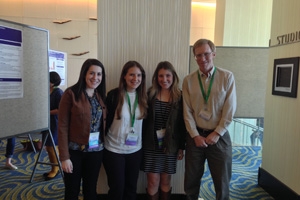Martha Falkenstein (PhD clinical psychology) has recently published research on trichotillomania (TTM), a characterized by the recurrent pulling of one’s own hair, resulting in hair loss. Falkenstein has contributed to several publications on this disorder in partnership with David Haaga, AU psychology professor and department chair. Her research has been published in a number of leading general interest and specialty journals, including Psychological Assessment, Journal of Consulting and Clinical Psychology, and the Journal of Obsessive-Compulsive and Related Disorders.
“On several fronts, Martha's work has the potential to result in more successful, more lasting treatment of TTM, which would in turn likely result in increased happiness and improved social and occupational functioning for millions of women and girls,” says Haaga.
Trichotillomania
Trichotillomania affects 1–2 percent of the population. It occurs in both boys and girls during childhood, but in adults, 80–90 percent of reported cases are women.
The disorder is categorized in the Diagnostic and Statistical Manual (DSM-5) under Obsessive-Compulsive and Related Disorders. The disorder is similar to Obsessive Compulsive Disorder because symptoms include feelings of compulsion and repetitive behavior. Those with this disorder may pull hair from their head or from other areas of their bodies. The warning signs, according to the Trichotillomania Learning Center, include wearing hats and wigs to cover up bald spots, excessive fiddling with one’s hair, preoccupation, depression, anxiety, career or academic decline, and changes in social behavior patterns.
Research Results
Several psychological therapies for trichotillomania have been developed. The most widely used therapy is habit reversal training (HRT), a behavioral method that teaches hair pullers to become more aware of cues that signal the start of a pulling episode, and to alternate behaviors they can perform instead of pulling. Although HRT has proven useful, it is not universally effective, and improvements are sometimes short-lived.
Some of Falkenstein’s research addresses this problem of relapse after treatment for TTM. One of her studies, published in Journal of Obsessive-Compulsive and Related Disorders, showed that, among those who had improved during treatment, patients who became completely abstinent from hair pulling were much more likely to maintain their gains than were those who reduced but failed to eliminate hair pulling.
Falkenstein’s research also considers how treatment options for TTM might be improved by being made more comprehensive in focus. One of her studies identified novel treatment targets for TTM therapists to consider. In an Internet survey 50 percent of hair-pullers reported problematic levels of social anxiety. Additionally, one third reported having pulled other people’s hair. Many others struggled to keep hair pulling secret from loved ones. Another of her studies, conducted as part of Falkenstein’s AU doctoral dissertation and to be published in Behavior Modification, was the first to codify in a treatment manual the procedures to be followed by therapists using the Comprehensive Behavioral (ComB) model.
Martha Falkenstein
Falkenstein began working with adults and adolescents with trichotillomania when she was an undergraduate student at the University of Maryland, when she volunteered at a residential treatment program at McLean Hospital, the largest psychiatric affiliate of Harvard Medical School. There, she helped treat patients with obsessive-compulsive disorder related disorders, including trichotillomania. After receiving a degree in psychology from the University of Maryland, Falkenstein became a clinical research coordinator at Massachusetts General Hospital, where she continued to work with patients with trichotillomania and other obsessive-compulsive related disorders.
Falkenstein is now researching trichotillomania in collaboration with Haaga. She entered AU’s clinical psychology PhD program to become a clinical researcher in a medical center. With the support of Haaga and other faculty members and students in the psychology department, she was able to obtain the training necessary to pursue a career in clinical research.
“Dr. Haaga has been there for each of these steps: encouraging me; providing guidance about developing, conducting, and publishing research; and about academic program requirements and how to move through the program efficiently. He has served as a model of diligence, efficiency, mentorship, and has also kept me enthusiastic and excited about doing research,” says Falkenstein.
After finishing her PhD this upcoming summer, Falkenstein plans on beginning a research career in a medical center. She wants to continue to research treatments for anxiety and obsessive-compulsive related disorders.



